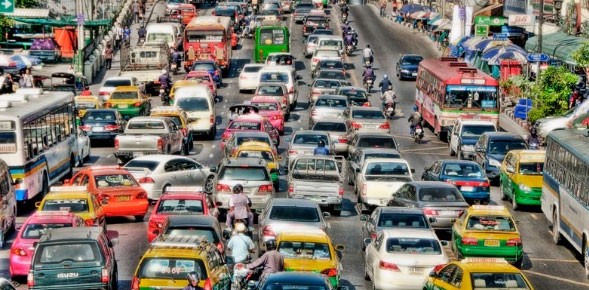A Government-sponsored financial incentive last year to stimulate car sales translated into increased congestion in Bangkok. The government is now considering ways to reduce the number of cars, even through a new congestion charge to go to the city centre…
BANGKOK- More than one million of new vehicles are hitting Bangkok streets since last year, following a scheme which provided a THB 100,000 refund for any new acquired vehicle. By the end of the year, the Excise Department declared to have registered 1.2 million of first-time car buyers for the promised tax rebate under the scheme.
The influx of new vehicles has grown a little bit more the total number of cars circulating every day in Bangkok. The city records some seven million vehicles on its roads, compared to a theoretical capacity of only 1.6 million vehicles according to the Bangkok Metropolitan Administration.
As year 2013 will be marked with the launching of new rail transit lines –with construction sites all over the city- conditions of circulation in Bangkok might further deteriorate. Thailand Transport Minister Chadchat Sittipunt explained to Thai media that the construction of four of five new railway projects will begin between January and September and that congestion could be expected for at least five years with the city’s boundaries.
The government is now looking at various solutions to ease traffic. It will boost the use of public boats along the canals in town. But he will also come up with coercive measures to reduce the total number of cars. The Transport Minister even evocated the inconceivable: taxing car owners using roads in inner Bangkok. “It is possible the government will start charging motorists for using roads in inner Bangkok,” Mr Chadchat said.
In other countries, such a congestion charge has shown that it effectively reduces traffic: In London, it is estimated that the congestion charge reduced the total number of potential chargeable vehicles entering Central London by 30%. In Singapore, the congestion charge reduced on average traffic by 24% while it has been in the range of 10% to 15% in Stockholm. Congestion charges have also other benefits such as rising the average speed in town and helped reducing the level of pollution in the air as well as emissions.
Meanwhile, Bangkok will see the start of the 22 km-long Red Line linking Bang Sue to Phaya Thai station, the terminal to the Airport Rail Link and further to Rangsit district. In September, construction works will also start on the Dark Green Line, linking Pathum Thani Province to Saphan Mai and Mochit areas. The construction of two more Rail Lines started last year and should be completed by 2017.
Luc Citrinot a French national is a freelance journalist and consultant in tourism and air transport with over 20 years experience. Based in Paris and Bangkok, he works for various travel and air transport trade publications in Europe and Asia.




![[PR] PR_Ascott and Vimut Hospital_2024](https://www.traveldailynews.asia/wp-content/uploads/2024/04/PR-PR_Ascott-and-Vimut-Hospital_2024-400x265.jpg)





























































